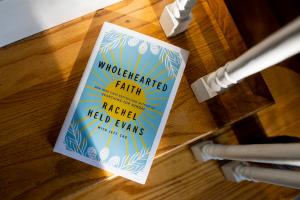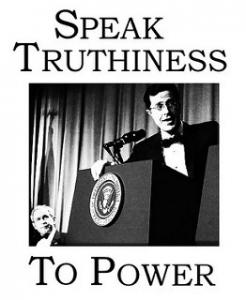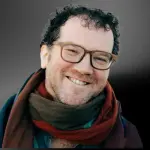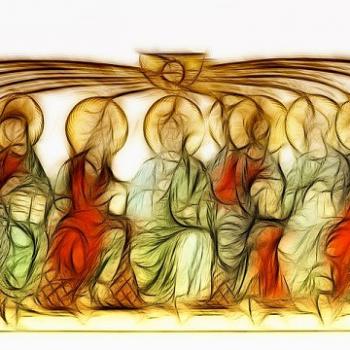I am always encouraged when I find that various topics and issues that I obsess about are obsessions for others as well. As anyone who reads this blog frequently or even occasionally knows, for instance, I am obsessed with the dangers of certainty. As I regularly argue for the virtues of doubt, I am often accused of being a relativist (which in the world of truth-seeking is close to being accused of being a socialist in politics) and a denier of absolute truth.
Accordingly, I was pleased to find that one of the main concerns of the first half of Wholehearted Faith, Rachel Held Evans’ final book (with Jeff Chu) that was published just a couple of weeks ago, is the importance of rejecting certainty and embracing doubt in the life of faith. I particularly enjoyed this passage:
Occasionally people will ask me what I think about absolute truth, which I like to consider an estranged cousin of certainty. They ask me if I believe in absolute truth and what I think absolute truth is, and sometimes they warn me of my apparent relativism and that proverbial slippery slope . . . It’s not that I don’t believe absolute truth exists, but if it does, it would take the mind of God to know it in its fullness . . . If it exists, I imagine it to be more like the wind, gently yet indirectly alerting us to its presence . . . But it’s impossible to bottle or to tame.
Ah, yes—absolute truth. My usual response to the question Rachel was asked is to say that I believe that absolute truth exists, but that I also believe that it is far more difficult to discover and identify that we might imagine. Rachel Held Evans said the same thing much more eloquently.
In what might appear to be a conflicting obsession, I frequently complain about the disappearance of commitment to facts in our contemporary world. Several years ago, the Oxford Dictionary named “post-truth” as its word of the year, an adjective defined as “relating to or denoting circumstances in which objective facts are less influential in shaping public opinion than appeals to emotion and personal belief.”  A decade earlier, the Merriam-Webster Dictionary word of the year was truthiness, defined as a quality characterizing a “truth” that a person making an argument or assertion claims to know intuitively “from the gut” or because it “feels right” without regard to evidence, logic, intellectual examination, or facts.
A decade earlier, the Merriam-Webster Dictionary word of the year was truthiness, defined as a quality characterizing a “truth” that a person making an argument or assertion claims to know intuitively “from the gut” or because it “feels right” without regard to evidence, logic, intellectual examination, or facts.
There is little doubt that we find ourselves in a world of truthiness, where fact-checking is an obsolete job description and how one feels is a better guide to what is true than anything an “expert” might have to say. Pilate famously asked Jesus “What is Truth”?—the post-fact world answer is “whatever most aligns with how you feel,” or more simply, “whatever the hell you want it to be.”
Feeling the truth in one’s gut does a nice end run on the inconvenient and often challenging activity, as I regularly challenge my students to do, of earning the right to have one’s opinion. Constructing arguments, supporting one’s premises with facts, and being open to changing one’s views in the face of contrary evidence is just so damned annoying and a waste of time. As philosopher Roger Scruton notes, in the world before post-truth,
People interested in truth seek out those who disagree with them. They look for rival opinions, awkward facts and the grounds that might engender hesitation. Such people have a far more complicated life than most.
But I have a problem. As noted at the beginning of this essay, I have said and written more times than I can count over the years that uncertainty is a good thing, that certainty is vastly overrated, and even that there are some areas of human activity (such as philosophy) where facts and definitive answers are far less important than open-ended inquiry and the conviction that the most important questions are never closed. Isn’t this, in its own way, a push-back against the importance of facts?
Even more importantly, the life of faith seems by its very nature to be immune to fact-checking. Although we are in Lent, I have Advent on my mind because my new book will be published a month or so before Advent this coming October. Conversations among persons of Christian faith will touch base with the foundational stories of Jesus’ birth in the gospels. Did they really happen in the way the authors claim? Does it matter that the stories are not entirely consistent with each other, that none of them include all of the features of the nativity story that we are so attached to? What if we found out that none of the details really happened in the ways described?
In truth (!), it’s just about guaranteed that none of the “facts” of the nativity story are “true” in a fact-checking sort of way—such is the nature of ancient texts and events that occurred (or didn’t) over two millennia ago. Does this then reduce faith to a “gut feeling” in the same way that “truthiness” reduces truth and facts? On a surface level, perhaps; but on the deepest levels, absolutely not.
I once asked a class a number of years ago, “If you consider yourself to be a Christian, would it make any difference to your faith if it could be definitively proven that Jesus never existed and that none of the stories in the gospel accounts are factually true?” I received a wide range of responses, but one in particular has stuck with me. A young lady, after much thought, said “No, I would still be a Christian because it makes me a much better person than I would be if I wasn’t one.”
There is a great deal of wisdom in her comment. Faith holds the believer to a far more rigorous standard than mere feelings or even facts. Whether or not Jesus was born in a manger or Mary was a virgin when he was born is far less important than what difference the stories and teachings reported in the gospels make in one’s life. I have often said and written that the best evidence for the truth of one’s faith is a changed life. As the blind man who is told by the Pharisee authorities that the man (Jesus) who healed him is a sinner said, “Whether he is a sinner or not I do not know but I know this—I was blind, and now I see.” That takes the issue to whole different level than fact-checking.













